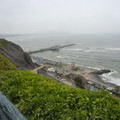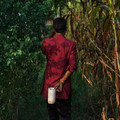Before I start let me say that the week we have spent in Thailand does not do justice to what this country offers. We did not visit the beaches of the South and there are lots more to see. Thailand is one of the more prosperous countries in the Far East; it is safe to travel here. During winter there are no rains and the humidity is low, although Bangkok is quite smoggy.
Bangkok
You’ll likely arrive at the new Suvarnabhumi airport (that experienced a multiply of early problems after it opened in 2006). It was designed by German/American architect Helmuth Jahn. You will only discover its beauty upon departure, when one normally has more time to linger.
Our first destination was the main railway station where I had to buy train tickets to go to Chiang Mai in three days time. The bus from the airport first goes on a motorway, but then gets into downtown and bogs down into the eternal traffic jams of Bangkok.
Having secured the tickets we got a taxi and gave him the hotel’s address on a piece of paper. I almost immediately noticed that he did not start the meter so I told him to do that. He just muttered that there was too much traffic and “waiting” and said the ride was “200 baht”. I commended him to stop. He did not. I pretended to write his name and number down (it was hanging there facing us) so he grudgingly started the meter. We ended up paying 120 bahts, (four dollars), and departed at the end in good spirits.
We reserved in a small hotel called Arun Residence, (www.arunresidence.com), a historic Sino Portuguese river house along the Chaophraya River. It is in the midst of a Thai neighbourhood in a side street, not the easiest to find, but close to many major sights. The hotel has only 5 rooms and a well known restaurant with decks overlooking the river. The view is unforgettable, especially at night when the Arun Wat temple on the opposite side gets lit up and traffic on the river shifts into the many illuminated river cruise/dinner boats that steam up and down. As hotel guests we had no problem getting a table, but otherwise you better had booking. The place filled up every evening with better off Thais wanting to impress their girlfriends or clients and with European tourists of the “in the know” types.
To avoid traffic jams travel to places where you can go via the river vaporettos or with the BTS Skytrain.
I mentioned vaporettoes, the city indeed does remind a bit of Venice, let’s just say the river is the Grand Canal and there are many side canals. A number of the historic sites are along the river….but this is a city of 10 million inhabitants.
We enjoyed the Venice like commuting (at fraction of the cost of a ticket that is charged in Venice I dare say). The landing is always preceded by the anchormen feverish whistle signals, when on board the conductor girl will come shaking a tin box full of change to remind you to buy your ticket. Tickets are dirt cheap at some 50 cents a ride. The best Bangkok experience involves just sitting there enjoying the sites and the river traffic.
The city has many temples called Wats, with plenty of Buddhas in them: a reclining Buddha here, an Emerald Buddha there. We have gotten a bit “out-Buddhad”… sacrilegious as it sounds I afraid.
We also visited the famous weekend market. We took the Sky train to get there. The Sky train is clean, air conditioned and goes about 4 floors high. The market is humongous, you are given a map. There is everything there for sale, from pet squirrels to antique, from designs of upcoming Thai fashion artists to silk, etc. We were both very impressed. Maria quickly purchased some silk cushion and bed covers that we evidently desperately needed. Prices are low and you gotta bargain, start at half the price what they ask (that I think is the real price anyways) and then inch upward so that they still get their extra “tourist profit”.
Thai food
We love to eat and to cook. Even the hotel where we stayed in Bangkok was selected after reading an article in the New York Times that fleetingly mentioned that it was a hotel also. Thai food is phenomenal. There is an explosion of flavours in your mouth when you taste it, the myriad of herbs, coriander, coconut milk, lemongrass, the abundance of fresh seafood and spices… it is impossible to recreate this in your own kitchen you must go there to experience it. Thai people love to eat. Cooking starts in earnest in the morning. The crowded living conditions and the heat means that they prefer to cook out in the open. In cities this means on the sidewalk in front of their living space. As you walk by you can see what’s for lunch/dinner. In addition you can see into the room where they all live and sleep. Many keep a few chickens and a rooster. These are kept under bottomless bamboo cages, so they can pick seeds and are moved along during the day. No need to buy eggs or for alarm clock either, the rooster does it! Since they cook on the sidewalk many have impromptu stalls to sell some, the name of “street food” takes a different meaning here.
One night we went to Chinatown to eat. It is well known for its hustle/bustle and street-food. We negotiated a tuk-tuk (motorcycle cab); it was a 20 minute ride. You hang on to your dear life, the drivers go at neck braking speed weaving in and out of traffic.
Here restaurants on the sidewalk compete with each other, filled with locals and tourists sitting along long tables side by side. All are drinking good Thai beer and eating inexpensive excellent food selected from well worn menus equipped with pictures for the sake of tourists. An unforgettable dinner here with beer for two may cost $20 for two. At our hotel with its view, tablecloth, fancy cutlery, etc. $100, but even this is a bargain, given the high standard of the food.
The food that is spicy is marked on most menus. I thought I was resistant to spicy food until I consumed a North Thai pork sausage dish in Chiang Mai. A delicious meal it was but at that night I suffered dearly. On top I had to listen to Maria’s remarks such as “you should have known better…”
Slow train to Chiang Mai
Chiang Mai is some 800 km North of Bangkok. There are many planes but taking the night (sleeper) train is recommended for enjoying a truly Thai experience. You can reserve 2nd class sleeper tickets on the internet, but advance 1st class for some reason can only bought in person at the station (or via agencies that truly overcharge).
So as I mentioned the first day we bought our tickets, going there only second class was left, coming back 1st class. The difference is that in 1st class you are in a private compartment, but second class is quite acceptable. The sleepers are air-conditioned and full of first world tourists. Our neighbours were two young German ladies who just completed a tour of Indonesia, one was writing a diary, a French couple, an American girl with a huge bag together with Indian looking young man who ought to have been born and bought up in Germany, spoke fluent German (and English)…but way too much, I daresay….
The train pulls out of Bangkok around 7 pm. We boarded early, this gives you the opportunity to see the night conductor getting himself ready, complete with him being half naked and washing himself at the sink in front of the passengers. The train has 3 times as many officials as in Europe or in America, there are the ticket controllers and assistants, the conductor who makes the beds, cleaning and security staff. It also goes 3 times as slow as trains I am used to; max speed seldom exceeds 60 km/hr. To reach Chiang Mai takes officially 14 hrs but hey it took 16! 1 and 1/2 hours is just to leave Bangkok; there is no right of way, the train leaving the station crosses many streets like a streetcar and as I mentioned there are traffic jams.
From your window you can see life along the tracks, many people live here in ram shack houses, walk across the tracks to borrow salt I guess. On the train you can order food and drinks that they bring to you from the dining car, but it is worthwhile to go there. A scene might just as well come from a Somerset Maugham novel: the night train chugging in the Asian night. The dining car has no AC; all windows are fully open creating a pleasant breeze. Order a Thai beer or maybe a gin and tonic. Nothing is expensive. Repeat it, you only live once! Look outside passing by land and strange stations with funny Thai writing; see Buddhist monks sleeping on benches in the middle of the night. You can not help to feel that you are on an adventure.
Before arriving into Chiang Mai in the morning the train crosses a tropical mountain forest, it is bright now, the single track is dangerously exposed on one side of the mountain, feels like going on a bridge. The speed at these exposed sections is no more than 15 km/hr. I would not like to do this in the rainy season!
Chiang Mai
Chiang Mai is the second largest city in Thailand, but with only 200,000 inhabitants it is much smaller than Bangkok. It is “the Vancouver of Thailand” I was told. A desirable place to live, better air, close to mountains, artists, universities. Our boutique hotel called the Rachamankha (www.rachamankha.com) was inside the walled city like an oasis, with a gorgeous pool. It belongs to the prestigious Relais Chateaux list of hotels. Opposite the pool was a two story building open on all sides called the Spa, where we had a Thai massage. Its starts with washing and massaging your feet. For the body no lubricants are used. Each of your muscles is expertly worked over by the strong masseuse, sometimes using her elbows and knees…she goes to the threshold of pain but never crosses it. Lying there look up study the ceiling fans or sideways view the coconut palm trees and listen to songs of tropical birds.
In the city just walk around. Surprises are abound. When a restaurant was full one night we left our name and said we would come back in half an hour. As we walked we saw light nearby. Taking the side street to get there we arrived at a square where an ancient temple was located, illuminated, complete with a Buddha statue at the top and monks wrapped in orange robes meandering here and there c/w stray dogs in the quiet of the night. The temple was Wat Chedi Luang built in the 14th century.
Chang Mai has many top of the class art and home decorating shops; also folk art is sold from all regions. The choice in silk and carvings is mind bogging. On the last day we got to know a tuk-tuk driver who led us to many art shops that we would never able to locate on our own.
There are cooking classes, hiking trips and river rafting available. Three days that we spent there are not enough. There are many inexpensive guest houses and strangely sometimes I felt like being somewhere in Austria, a lot of wood is used in the construction of buildings and the mountains are close.
One day we visited an elephant farm and a village of the long neck tribes (who live in these mountains). For this we hired through the hotel a driver. It is a day long affair and concludes with the visit to the Buddha shrine on top of the mountain outside the city. By this time I ran low on cash (buying tickets here and there, tipping elephant handlers and oxen cart drivers exhausted my cash reserve) so at the bottom of the Buddha shrine I went to the ATM machine wanting to get out 5000 bahts. This choice was not available so I accidentally pushed the 20,000 button and the machine happily started to burr counting down 20 1000 bills, a value of over 600 dollars! This on the second last day in Thailand, with our hotel already paid via the Internet. I got reprimanded by Maria. Anyways on the top of the mountain with cash in my pocket I paid for the espresso (60 bahts) with a 1000 bill. The young Thais at the cashier seldom saw this big bill, but to their credit dutifully accepted it and in their confusion they gave me back 100 bahts more money than I was owed! We had our coffee then I went back and explained their mistake and gave the extra money back. They said Buddha’s blessing will follow me in my journeys.
Our driver waited at the bottom of the temple stairs and on the way of returning to the hotel offered to drive through the University campus. Much like here, full of students coming out of the afternoons’ classes milling/horsing around socialising. I think there is a bright future in front of them; Thailand is a rapidly developing country.
Jim Thompson
On our last day, arriving from Chiang Mai and having eight hours to spend in Bangkok we went to see the Jim Thompson House (http://www.jimthompsonhouse.com/). Now I am sure that you have never heard of him but he was a well known US expatriate, to whom Thailand has a lot to thank. Coming from a prosperous Delaware family he had a large role to bring Thailand’s treasures to the attention of the world.
He was a mysterious character largely due to his sudden disappearance without trace in 1967 while on a walk on Eastern Sunday in the highlands of neighbouring Malaysia. I recommend that you Google it.
Briefly, he was a Princeton architectural graduate who served in the 2nd World war and was posted into Bangkok by the CIA at the end of the war. He fell in love with Thailand and decided to settle here. His wife did not follow him. An avid art collector he discovered native skills and through his connections in New York found markets for Thai silk and other products. He essentially revived these skills that were on the way of dying out. He did not introduce mass manufacturing methods but encouraged home based production allowing the mainly illiterate women suppliers to continue to look after their family while making the fine clothes, resulting betterment in their families standard of living. His house, located downtown but in a quiet upscale street beside a little canal is now a museum and a fine example of Thai teak (wooden) architecture. His collection is on display and his silk venture is a thriving business with upscale shops at the museum, at the airport and in many big cities all over the world.
Ottawa, 8, February, 2010





